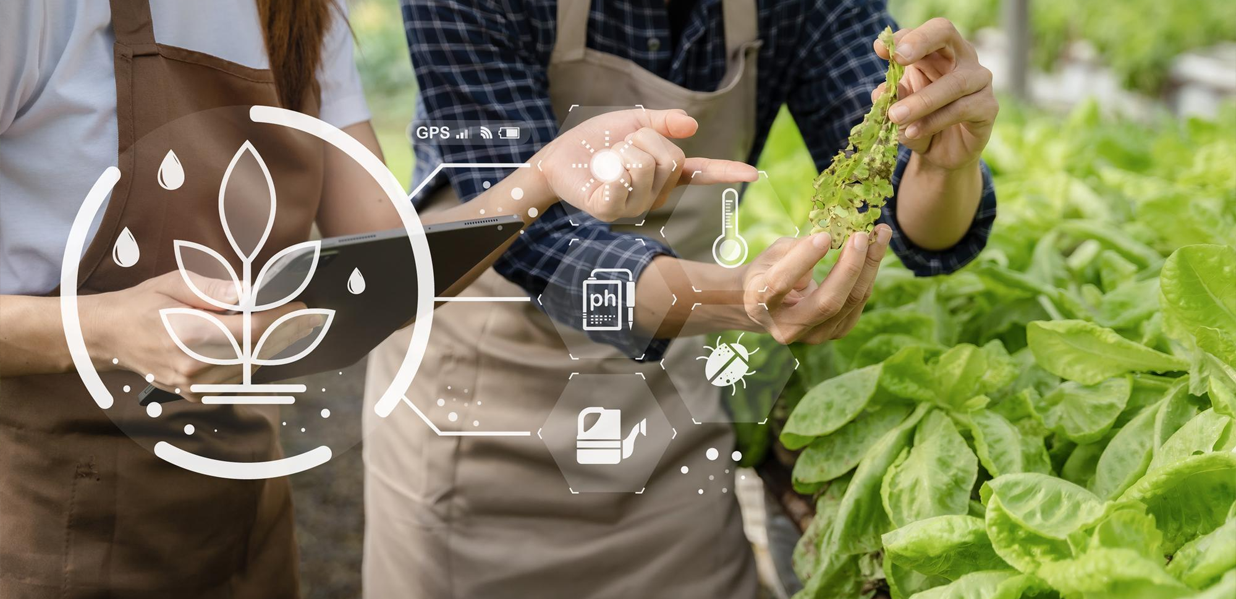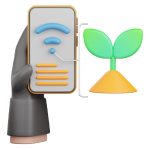Sustainable and Efficient Farm Management: The Future of Agriculture
Since the penetration of technology in almost every sector, we are deeply immersed in the agriculture sector. We are thrilled to know how technology will change the future of agriculture. Now. we are just imagining a world where farms flourish sustainably, balancing nature's needs with our own.
And those who share their interest in agricultural advancements, they might know that, this isn't a distant dream now, but a rapidly unfolding reality. Today's agriculture is evolving beyond traditional methods, integrating sustainability and efficiency at its core.
In this blog, we'll uncover how innovative practices, smart technology, and a deep respect for the environment are reshaping farming. Get ready to discover how agriculture is growing greener, smarter, and more sustainable for our future.
Sustainable Farming Practices
Sustainable farming is more than just a concept; it's a necessary approach to ensure we can feed ourselves without harming the planet for future generations. But what does sustainable farming really look like? Let’s break the key practices, each vital for maintaining a balance between our needs and the environment's health.
Conservation Agriculture
Conservation agriculture revolves around three core principles: minimal soil disturbance, maintaining soil cover, and crop rotation.
- Minimal Soil Disturbance: This means reducing activities like plowing and tilling. Less disturbance means soil structure remains intact, preserving its organic matter and microorganisms that are crucial for soil health.
- Maintaining Soil Cover: Using cover crops or leaving crop residues on the field shields the soil from erosion caused by wind and water. It also helps in retaining moisture.
- Crop Rotation: Growing different types of crops in a sequential manner enhances soil fertility and breaks cycles of pests and diseases, reducing the need for chemical inputs.
Organic Farming
Organic farming emphasizes the use of natural inputs and processes to maintain ecosystem balance. Key aspects include:
- Natural Fertilizers: Compost, animal manure, and green manure replace synthetic fertilizers. These natural options release nutrients slowly and improve soil health over time.
- Natural Pest Control: Instead of synthetic pesticides, methods like using beneficial insects, trap crops, and natural repellents help control pests.
Integrated Pest Management (IPM)
IPM is a holistic approach to pest management. It integrates various methods to manage pests in an environmentally friendly and economically viable way:
- Biological Control: Using natural predators or parasites to control pest populations.
- Cultural Practices: Crop rotation, intercropping, and sanitation to disrupt the habitat of pests.
- Chemical Control: When necessary, using pesticides selectively and in a way that minimizes harmful effects.
Water Management
Efficient water management is crucial, especially in regions facing water scarcity:
- Drip Irrigation: This system delivers water directly to the base of the plant, minimizing evaporation and water loss.
- Rainwater Harvesting: Collecting and storing rainwater for agricultural use can significantly reduce dependence on other water sources.
Agroforestry
Adding to these practices, Agroforestry is an innovative method combining agriculture and forestry:
- Diverse Planting: It involves planting trees alongside crops or livestock. This diversity can lead to healthier soil, increased biodiversity, and improved crop yields.
- Climate Resilience: Trees can provide shade, acting as windbreaks, and helping to regulate the microclimate, which can be particularly beneficial in the face of climate change.
Looking to Implement AI/ML in for efficient sustainable farming?
You can do accurate and precise discussion with our expert!
Schedule a meeting
Farm Management
Farm management is a multifaceted approach combining both art and science to optimize the output and profitability of farming operations, all while upholding sustainability. Let's explore the key components of efficient farm management.
Crop Planning and Rotation
Just like we change our diets to stay healthy, farms need diverse crops to maintain soil health.
- Diversity: Planting a variety of crops helps in preventing the depletion of certain nutrients from the soil.
- Rotation: Regularly changing what’s planted in each field helps break cycles of pests and diseases, reducing the need for chemical interventions.
Livestock Management
Taking care of farm animals is more than just providing food; it's about ensuring their overall well-being.
- Nutrition: Proper feeding is crucial. This involves not just the quantity but also the quality of feed.
- Healthcare: Regular check-ups, vaccinations, and prompt treatment of illnesses are essential.
- Breeding Practices: Responsible breeding helps maintain healthy livestock populations and can improve productivity.
Resource Management
Farming requires resources like water, fertilizers, and energy. Using them efficiently is key to sustainability.
- Water Usage: Implementing systems like drip irrigation ensures that crops get enough water without wastage.
- Fertilizer Application: Using the right amount of fertilizers at the right time can reduce excess runoff that might harm nearby ecosystems.
- Energy Efficiency: Utilizing renewable energy sources and optimizing machinery usage can cut down on energy costs and carbon footprint.
Financial Management
A farm is also a business, so keeping a close eye on the finances is vital for its survival.
- Budgeting: Planning and monitoring expenses and income helps in making informed decisions.
- Investments: Deciding when and where to invest, be it in new technology or infrastructure, is crucial for long-term success.
Technology Integration
Incorporating technology is an emerging aspect of modern farm management.
- Precision Agriculture: Using technology like GPS and data analytics helps in making precise decisions about planting, fertilizing, and harvesting.
- Farm Management Software: These tools can track farm activities, manage resources, and provide valuable insights for decision-making.
Supply Chain Management Facilitated by AI and Blockchain Tech
In the agricultural supply chains, where products move from farm to table, technology plays a transformative role. Artificial Intelligence (AI) and Blockchain technology are key drivers in making these supply chains more efficient, transparent, and sustainable. Let's explore how these technologies are reshaping the way we manage agricultural supply chains.
AI in Precision Agriculture
Precision agriculture is a farming management concept that uses technology to ensure crops and soil receive exactly what they need for optimum health and productivity. AI enhances this concept significantly:
- Data Analysis: AI algorithms can analyze vast amounts of data from satellite images, weather forecasts, and sensors in the field. This analysis helps in understanding soil conditions, crop health, and environmental factors.
- Informed Decisions: With AI, farmers can make more accurate decisions about when to plant, irrigate, and harvest. This leads to higher yields, lower costs, and minimal environmental impact.
Blockchain for Transparency
Blockchain technology is like a digital ledger that records transactions in a secure, transparent, and immutable way. Its application in agriculture ensures traceability and transparency:
- Traceability: Each product can be traced back to its source. Information like where and how crops were grown, and how they were processed, is available in the blockchain.
- Consumer Trust: This level of transparency builds trust among consumers. They can be confident about the quality and origin of their food, which is increasingly important in today's health-conscious world.
Smart Logistics
The combination of AI and the Internet of Things (IoT) has led to smarter logistics solutions in agriculture:
- Optimized Routes: AI algorithms can analyze traffic patterns, weather conditions, and vehicle health to suggest the most efficient routes for transporting produce.
- Reduced Waste: By optimizing delivery routes and storage conditions, AI and IoT help in reducing food waste, a significant challenge in the agricultural supply chain.
Leverage AI & IoT For Enhanced Farm Management!
Reach us with your Technology Requirements.
Enhanced Market Access
Adding to these, technology also facilitates better market access:
- Market Information: AI systems can analyze market trends, consumer demands, and price fluctuations. This helps farmers and distributors in making informed decisions about what to produce and when to sell.
- Direct Connectivity: Platforms enabled by AI and blockchain can connect farmers directly with buyers, bypassing traditional middlemen. This can lead to better prices for farmers and fresher produce for consumers.
How Infiniticube Can Assist You
Infiniticube stands at the forefront of this agricultural revolution. Our software solutions are tailored to meet the unique challenges and opportunities of modern farming. From precision agriculture tools powered by AI to blockchain solutions for supply chain transparency, we offer a suite of services that cater to all aspects of farm and supply chain management.
Ready to transform your farming practices and embrace the future of agriculture? Contact us today for innovative software solutions that will take your farm management to the next level. You can schedule a discovery call with our expert to discuss your requirements in detail.
 June 27, 2025
June 27, 2025
 Balbir Kumar Singh
Balbir Kumar Singh
 0
0
 June 13, 2025
June 13, 2025
 Balbir Kumar Singh
Balbir Kumar Singh
 0
0











Leave a Reply